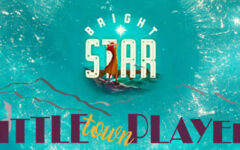 As reported at the time, William Anderson ‘Bill’ Bolick, the mandolin-playing, tenor-singing half of the duo known as the Blue Sky Boys, passed away on March 13, in Hickory, North Carolina. He was 90 years old.
As reported at the time, William Anderson ‘Bill’ Bolick, the mandolin-playing, tenor-singing half of the duo known as the Blue Sky Boys, passed away on March 13, in Hickory, North Carolina. He was 90 years old.
Born October 29, 1917, and raised in East Hickory, North Carolina, Bill and his younger brother Earl – the fourth and fifth of six children by deeply religious parents – learned how to harmonize by singing hymns and gospel songs at home. Bill learned how to play guitar and banjo from his neighbor, teaching Earl in the process. Earl had originally been given a mandolin, but he preferred guitar, so the two brothers switched instruments and began performing as a duo.
Bill also performed with another local group, the Crazy Hickory Nuts, who happened to land a radio spot in Asheville, North Carolina, in 1935. Shortly afterward, the siblings formed the JFG Coffee-sponsored The Good Coffee Boys with Homer Sherrill, a fiddler who played with the Crazy Hickory Nuts. The new group also had a regular spot on WWNC Asheville radio. The group stayed in Asheville for a while, before moving to WGST Atlanta, where sponsored by Crazy Water Crystals, they played as the Blue Ridge Hillbillies. The trio, dressed in plaid shirts and straw hats, subsequently worked as The Brooks Shatterly Blue Sky Boys.
While in Atlanta, the Bolicks split away from Sherrill and recorded several sides for RCA Victor, which were released under the now-abbreviated name The Blue Sky Boys.
They recorded their first session for RCA’s Bluebird label on June 16, 1936, producing ten sides including I’m Here To Get My Baby Out Of Jail, the popular Sunny Side Of Life, (not to be confused with the Carter Family’s Keep On The Sunny Side), Midnight On The Stormy Deep, Down By The Banks Of The Ohio and I’m Troubled, I’m Troubled. Bill was just 18 years old, Earl was 16.
During the next four years, the Blue Sky Boys made another 80 recordings for RCA that made them one of the more popular brother duos of the period. In so doing, they popularized ballads like Mary of the Wild Moor and Story Of The Knoxville Girl. Alongside these were traditional numbers like The Banks Of The Ohio, Little Bessie and Katie Dear; old parlour ballads and popular songs such as There’ll Come A Time and Are You From Dixie?; and the sacred songs, Row Us Over The Tide, Kneel At The Cross, Whispering Hope and I Need The Prayers (Of Those I Love).
During this time the Blue Sky Boys had radio shows in Raleigh (on WPTF), where they stayed for more than two years before moving on to WFBC in Greenville, South Carolina.
Their careers was sidetracked in 1941 when the brothers both entered the military to fight in World War II. Bill Bolick served in the Pacific area until his discharge on Christmas Day, 1945.
After their discharge they returned to playing radio in Atlanta and recording for RCA.
Many of their records from 1946 and 1947, including Kentucky and Dust On The Bible, ranked among their biggest hits. While Sold Down The River and Behind These Prison Walls Of Love have now been regularly heard at bluegrass festivals across the nation. Whereas the pre-war sessions featured duets with only mandolin and guitar, these discs featured a fiddler – either Sam “Curley” Parker or Ben Lambert. By now the brothers were actually writing songs of their own. I Love Her More, Now Mothers Old and There’s Been A Change fall into this group of additions to the duo’s repertoire.
The Blue Sky Boys didn’t record at all during 1948 and there were only three sessions in the whole of 1949 and 1950. However, this era did include The Sweetest Gift A Mother’s Smile, which they learned from Martha and James Carson and has subsequently inspired Hazel Dickens and Alice Gerrard; the Judds; and Linda Ronstadt and Emmylou Harris to record it.
In 1950 they moved to Shreveport, Louisiana, where they briefly joined the cast of the Louisiana Hayride. This wasn’t a successful time for them and Bill and Earl soon returned to the more familiar territory of Raleigh, North Carolina. However, frustrated by changes in country music; Honky Tonk music was very much in vogue at this time, the Blue Sky Boys disbanded in 1951and retired from music. Bill Bolick went to work with the railway mail service in Washington, DC and then transferred to Greensboro, North Carolina. In February 1957, he married Doris Wallace, who survives him.
In 1962 Starday Records released an album of radio transcriptions, ‘A Treasury Of Rare Song Gems’. The following year, prompted by the interest of Don Pierce (of Starday) and Archie Green, Bill and Earl used some of their vacation time to go to Nashville and record two albums, the secular Together Again and the inspirational Precious Moments for Starday.
In 1965, following an appearance at the UCLA Folk Festival, Capitol released a studio album, Presenting The Blue Sky Boys. It featured older songs such as Midnight Special, Oh Marry In Time, Cotton Mill Colic and Oh Those Tombs; 12 songs in all, each never previously recorded by the brothers. That 1964 appearance at the UCLA concert was recorded and subsequently issued on a Rounder LP.
The Bolick brothers were coaxed out of retirement yet again in 1975, recording an album for Rounder and playing at several bluegrass and folk festivals. Shortly afterward, Bill retired finally and moved back to his hometown of East Hickory.
Between 1993 and 1997 Copper Creek Records released six CDs worth of radio transcriptions, material that Bill Bolick had diligently kept safely from the late 1940s. We should be forever grateful to Bill for that.
The Blue Sky Boys also received belated recognition for their achievements when the German label Bear Family Records issued a 123-song box set compilation of the duo’s recordings.
The Bolicks are noted for their intricate yet simple harmonies, their perfectly matching voices, and their unadorned mandolin and guitar instrumental backing, which set them off from the competition, so much so that two generations of subsequent duet singers echo them, some without realising it.
Country music scholar Bill Malone described their sound as “the prettiest and smoothest harmony ever achieved in country music.”
Earl Bolick died on April 19, 1998, apparently of a heart attack.
I asked Gary Reid for some thoughts about Bill Bolick and the Blue Sky Boys music, enquiring first about Bill the person, rather than the musician.
What he was like as a person?
“I enjoyed knowing Bill Bolick. I visited him at his home on several occasions and traded correspondence with him over the years. I always found him to be a very gracious host and enjoyed the many stories that he would tell me of the old days. By his own admission, he was proud of the work that he and Earl did together. He remained true to their style even when confronted with requests for changes from sponsors or producers that might have broadened their appeal. And, if they felt they were being treated shabbily in any of their business dealings, they didn’t stick around too long. In short, I’d say Bill was a very principled individual.”
I understand that he was the driving force behind all [nearly all] that the Blue Sky Boys did, at he was so for the various ‘reunions’ / re-kindling of their musical career.
“I think it’s safe to say that Bill Bolick had the passion for their music. He was instrumental in selecting and arranging the bulk of their material as well as handling a lot of the business chores.”
The part that he has / the brothers have played in bluegrass music, repertoire [at least].
“Obviously the Blue Sky Boys were not a bluegrass outfit although some of their Camden releases of the 1960s tried to portray them as such. Even at their first recording session in 1936, their producer remarked something to the effect, ‘Oh, you’re the boys who sound like the Monroe Brothers.’ To which Bill Bolick emphatically replied, ‘No.’
While the duo was not bluegrass, their music appealed to many of the same people who enjoyed it, including a number of the first generation performers. The paths of the Blue Sky Boys crossed several times with the Stanley Brothers, first in 1948 in Raleigh, North Carolina where they were both on radio, and again in 1949 on WCYB’s popular Farm & Fun Program in Bristol, Virginia. They worked several shows together during this period. Several songs of the Blue Sky Boys later crept into the repertoire of the Stanleys.
Don Reno was known to be an admirer of Bill and Earl Bolick and at times it’s easy to hear elements of Bill’s tenor in Don’s singing. Other groups such as Jim & Jesse, the Osborne Brothers, the Country Gentlemen, the Seldom Scene, and country music’s the Louvin Brothers all made use of material that the Blue Sky Boys introduced on record in the 1930s and ’40s. Even more contemporary artists such have Emmylou Harris have drawn material from the Bolicks.
I remember in the early and middle 1970s, as a number of us in the Washington, DC area were finding our musical roots, the Blue Sky Boys were one of the key groups that we listened to. Dudley Connell related that for a period of time, it was the music of the Blue Sky Boys that he woke to in the mornings before heading out to work.
Some of the last work the Blue Sky Boys did together included appearances at several bluegrass festivals; I believe these were Carlton Haney productions. While the performances adhered to their original mandolin/guitar formula, they were exposing festival goers to their brand of music.”
Discography:
| In Concert, 1964 | Rounder | ROUN11536 |
| Blue Sky Boys | Rounder | ROU0052 |
| Blue Sky Boys on Radio, Vol. 1 | Copper Creek | CCCD-0120 |
| Blue Sky Boys on Radio, Vol. 2 | Copper Creek | CCCD-0121 |
| Blue Sky Boys on Radio, Vol. 3 | Copper Creek | CCCD-0145 |
| Blue Sky Boys on Radio, Vol. 4 | Copper Creek | CCCD-0146 |
| Farm & Fun Time Favorites, Vol. 1 | Copper Creek | CCCD-0125 |
| Farm & Fun Time Favorites, Vol. 2 | Copper Creek | CCCD-0126 |
| Sunny Side of Life | Bear Family | BCD-15951 |







